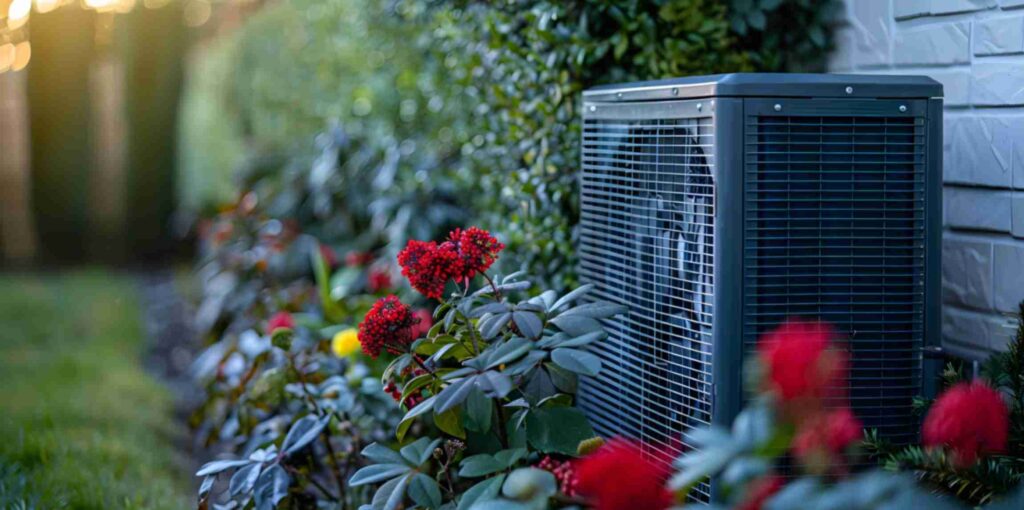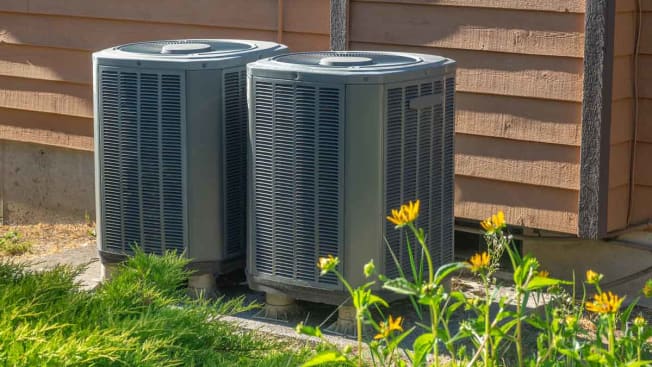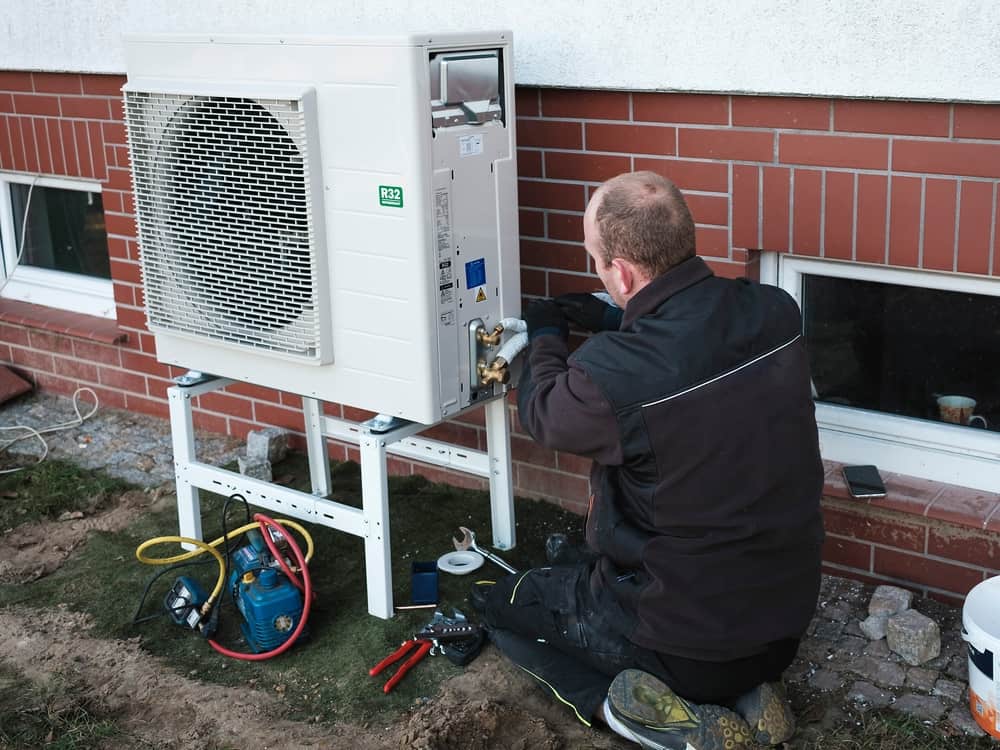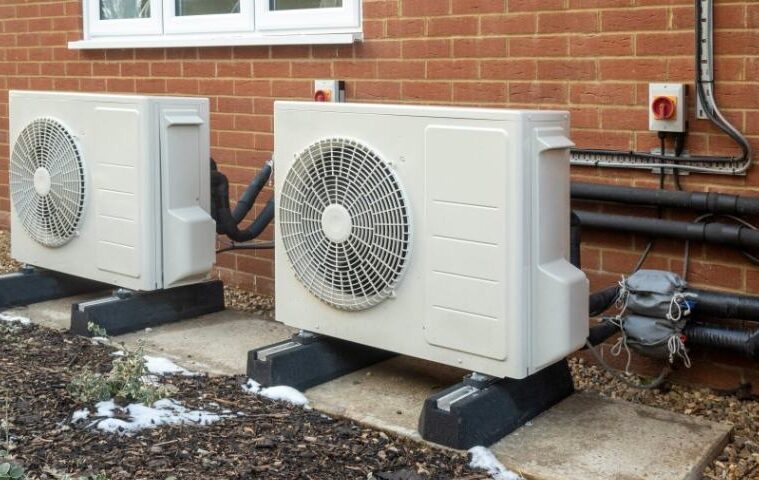Heat pumps offer homeowners an efficient and versatile solution for heating and cooling needs. These systems can significantly reduce energy costs and environmental impact while providing reliable comfort year-round. At IRBIS HVAC, we specialize in heat pump installation, ensuring that our customers receive the highest quality service and expertise.
This article aims to guide homeowners through installing a heat pump. From understanding the benefits and types of heat pumps to the installation process and maintenance tips, we’ll cover everything you need to know to make an informed decision and enjoy the full benefits of this innovative technology.
What is a Heat Pump?

Heat pumps have two main components: an outdoor unit (similar to a central air conditioner) and an indoor unit. These components are connected by refrigerant lines that facilitate the heat exchange process. The system operates efficiently by leveraging the principles of thermodynamics and utilizing a refrigerant to absorb and release heat as needed.
Benefits of Installing a Heat Pump
Energy Efficiency and Cost Savings

source – source consumerreports
One of the primary benefits of installing a heat pump is its exceptional energy efficiency. Heat pumps use electricity to transfer heat rather than generate it, making them much more efficient than traditional heating systems like furnaces or boilers. This efficiency translates into significant cost savings on your energy bills. Because heat pumps move heat rather than creating it, they can deliver up to three times more heat energy to a home than the electrical energy they consume, resulting in lower utility costs.
Environmental Benefits
Heat pumps are environmentally friendly because they reduce the reliance on fossil fuels for heating. By using electricity, which can be sourced from renewable energy, heat pumps help lower greenhouse gas emissions. Additionally, their high efficiency means they consume less energy overall, reducing their environmental impact. This makes installing a heat pump an excellent choice for homeowners looking to reduce their carbon footprint and contribute to a more sustainable future.
Versatility in Both Heating and Cooling
A significant advantage of heat pumps is their ability to provide heating and cooling from a single unit. During the winter, the heat pump extracts heat from the outdoor air and transfers it indoors to warm your home. In the summer, the process reverses, and the heat pump removes heat from your indoor air and releases it outside, effectively cooling your home. This dual functionality makes heat pumps a versatile solution for year-round climate control, eliminating the need for separate heating and cooling systems.
Improved Home Comfort
Heat pumps offer superior home comfort by maintaining consistent indoor temperatures and providing an even warm or cool air distribution. They operate quietly, reducing noise levels compared to traditional HVAC systems. Additionally, many heat pumps come with advanced features like programmable thermostats and zoning capabilities, allowing you to customize the temperature in different areas of your home according to your preferences. This level of control ensures that your home remains comfortable throughout the year.
Preparing for Heat Pump Installation
Evaluating Your Home’s Suitability for a Heat Pump

source – bakerhomeenergy
Before installing a heat pump, it is essential to evaluate whether your home is suitable for this type of system. Factors to consider include the size and layout of your home, the existing heating and cooling systems, and your home’s insulation and airtightness. Homes with good insulation and proper sealing are ideal candidates, as these conditions ensure the heat pump operates efficiently.
Importance of Professional Assessment and Consultation
A professional assessment and consultation are crucial steps in the preparation process. At IRBIS HVAC, our experts thoroughly evaluate your home to determine the best heat pump system for your needs. This includes assessing your current HVAC setup, understanding your heating and cooling requirements, and providing recommendations based on your home’s specific characteristics.
Necessary Home Modifications
Depending on your home’s current infrastructure, some modifications might be necessary to ensure the optimal performance of your new heat pump. These modifications can include:
- Ductwork. If your home has an existing duct system, it may need to be inspected and possibly upgraded to ensure compatibility with the new heat pump.
- Insulation. Proper insulation is essential for maintaining a heat pump’s efficiency. Adding or improving insulation can help prevent heat loss and improve overall performance.
- Electrical Upgrades. In some cases, your home’s electrical system might need to be upgraded to handle the power requirements of the new heat pump.
The Heat Pump Installation Process
Steps Involved in Installing a Heat Pump

source – vaillantcouk
1. Initial Consultation and Assessment
The installation process begins with an initial consultation and assessment. During this stage, our IRBIS HVAC professionals visit your home to evaluate its suitability for a heat pump. We discuss your heating and cooling needs, inspect your existing HVAC setup, and provide recommendations on the best type and size of heat pump for your home.
2. Choosing the Right Type and Size of Heat Pump
Selecting the right type and size of heat pump is critical for ensuring optimal performance and efficiency. Our experts help you choose a heat pump that meets your specific needs, considering factors such as your home’s size, climate, and budget. We offer a range of heat pump options, including air-source, ground-source (geothermal), and ductless mini-split systems.
3. Installation Day: What to Expect
Our team arrives on-site on installation day with all the necessary equipment and components. The installation process typically involves:
- Setting Up the Outdoor Unit. Placing the outdoor unit in an optimal location to ensure efficient operation.
- Connecting the Indoor Unit. Installing the indoor unit(s) and connecting them to the outdoor unit via refrigerant lines.
- Electrical Work. Ensuring the system is wired correctly and connected to your home’s electrical system.
- Ductwork and Insulation. Make any necessary modifications to your ductwork and insulation to optimize performance.
4. Post-Installation Inspection and Testing
Once the installation is complete, our team conducts a thorough inspection and testing of the system to ensure it operates correctly and efficiently. This includes checking refrigerant levels, verifying electrical connections, and testing the heating and cooling functions. We also provide you with instructions on how to use and maintain your new heat pump system.
Conclusion
Professional heat pump installation ensures optimal performance, energy efficiency, and long-term reliability. At IRBIS HVAC, our expert team is dedicated to providing top-quality installation services tailored to your home’s needs. We encourage homeowners to contact us for a consultation to explore the best heat pump options for their specific requirements. A well-installed heat pump system offers significant long-term benefits, including enhanced comfort, reduced energy costs, and a smaller environmental footprint. Trust IRBIS HVAC to deliver a seamless installation experience and enjoy the lasting advantages of a modern, efficient heat pump system.



